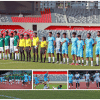Wheels finally fall off

Golam Rabbani Choton probably cannot remember the last time he was sitting at home while his charges were training at the Bangladesh Football Federation (BFF) astroturf, a place he had known to be home for more than a decade-and-a-half.
The 53-year-old has been replying to constant queries from journalists ever since he dropped the bombshell announcement on Friday that he would be leaving the BFF at the end of this month.
There has not been an official announcement yet, but the veteran coach is adamant about sticking to his decision. While Choton is using 'physical fatigue' as the reason, it is widely believed, and apparent from his recent remarks, that he is tired of not getting much-deserved recognition and reward from the BFF nor enjoying the work environment in the federation.
Choton's announcement came hours after prolific striker Sirat Jahan Swapna announced her retirement from the women's football team, which itself came on the heels of the retirement of two other members of the SAFF-winning team. All those incidents are interlinked and a result of the deprivation from the BFF.
Women's football has been propping up the image of Bangladesh's sinking football scene over the last decade, winning a number of trophies at age-group level in South Asia before finally clinching the SAFF Women's Championship for the first time in September last year.
It is the hard work of Choton and his deputies -- Mahbubur Rahman Litu and Ananya -- and the effort of Sabina Khatun, Swapna, Sajeda Khatun and many more, who have overcome many hurdles and sacrificed being with their families to earn accolades for the country.
Unfortunately, players are the least rewarded, with the monthly salary of a majority of the 70 players in the camp ranging from Tk 5,000 to Tk 10,000 and the best getting close to Tk 20,000.
The players have staged two walkouts from the camp in recent times demanding better salaries and facilities, but their demands have not yet been met despite the BFF president Kazi Salahuddin promising a raise in February this year.
Some of the star players have been barred from accepting proposals to play in other South Asian leagues in view of a proposed Women's Super League, but that event is far from seeing the light of day.
Since the SAFF triumph, the senior team players have only been training, without assurances of playing competitive football and without any sign of a financial windfall.
The coaches are not well-paid either. Choton currently receives Tk 1,50,000 -- increased from Tk 1,00,000 in November last year -- despite the fact that he has to look after all the women's teams under the BFF, starting from the lowest age-group team to the senior team. The two other assistant coaches receive a lot less than that.
Ironically, the lion's share of salary in the BFF goes into another account belonging to its technical director, reportedly close to Tk 20 lakh.
The man in question, Paul Smalley, handles a lot of other things, but his role with the women's teams is where the troubles are most pronounced. The Englishman is a regular fixture with all the women's teams, so much so that he takes a front seat in the dugout when the team is playing a competitive match.
The coaching staff have often expressed their displeasure about Smalley's meddling in aspects of the team, starting from their training regime to food charts and game plans. The players have often put the blame on him for blocking their path to foreign leagues.
Yet, Smalley reigns supreme in the BFF's corridors, having recently negotiated a pay rise of Tk 5 lakh to extend his contract.
While the likes of Swapna, Choton and many more leave the edifice of glory that they had built over years with their sweat and tears, Smalley remains an immovable force. And with a section of the BFF top-brass behind him, he continues to sell women's football at the expense of the footballers.

 For all latest news, follow The Daily Star's Google News channel.
For all latest news, follow The Daily Star's Google News channel. 








Comments